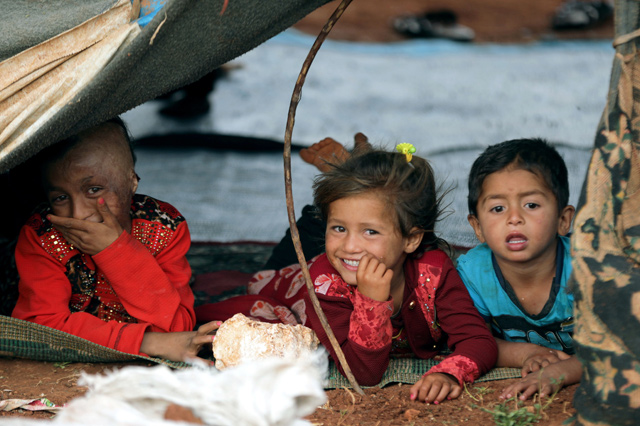PARIS — Twelve orphaned children of French militants were flown home on Monday from camps in Syria, along with two Dutch orphans who were handed over to The Netherlands, the French foreign ministry said.
The latest repatriations of foreigners from northeast Syria involved a group of children that were "isolated and particularly vulnerable", the French ministry said, adding that some of the children were sick and malnourished.
The orphans, the oldest of whom is aged 10 according to Syrian Kurdish officials, had been held in two camps housing tens of thousands of people who fled recent fighting against the Daesh group.
They were handed over to French and Dutch officials by Syrian Kurdish authorities, said Abdelkarim Omar, a senior Kurdish official.
The transfer, which took place on Sunday in the town of Ain Issa, near Syria's border with Turkey, marks the latest step in efforts to resolve the problem posed by the huge numbers of foreign militants and their families stranded in Syrian camps.
Last week, two American women and six children from suspected terrorist families were repatriated.
France has one of the largest contingents of militants who were captured or turned themselves in, together with their families, in the final stages of the US-backed Kurdish assault on the last fragment of Daesh’s "caliphate".
Paris has been loath to take back French fighters or their wives, seeing them as a security threat and arguing that they should face local justice.
Samia Maktouf, a lawyer representing some of the French militants' families, welcomed the repatriation of the latest group of children as a "very important step".
"It's about the security of the children, whose lives were in danger. They are French, they have their place in France," she told AFP.
‘Inhumane treatment’
Larger than expected numbers of families emerged from the ruins of the last Daesh enclave and the fate of tens of thousands of them remains unclear.
French Foreign Minister Jean-Yves Le Drian last month estimated the number of French nationals living in Kurdish camps at between 400 and 450.
The government had already repatriated five orphans from Syria in mid-March, as well as a three-year-old girl whose mother was sentenced to life imprisonment in Iraq.
The foreign ministry on Monday said it could carry out a third such operation if it identified other vulnerable children, amid reports that plans are afoot for further transfers in the coming days.
A major sticking point in the repatriation of children has been France's refusal to allow their mothers, some of whom acted as cheerleaders for Daesh, to return home.
France's human rights ombudsman Jacques Toubon last month accused the government of treating the women and children in an "inhumane and degrading" manner.
Britain has also taken a hard line with militants’ wives, notably stripping a teenager who ran away to Syria to join Daesh of her British citizenship.
The Kurdish administration in north-eastern Syria is not officially recognised and the legal framework for any repatriations and transfers is unclear at best.
Slow trickle
The biggest returns so far have been to Kazakhstan, Uzbekistan and Kosovo, and countries such as Russia, Sudan and Norway have also started taking back some of their nationals.
But the movement has been sluggish and Al Hol, the main camp in the Kurdish region, is still bursting with more than 70,000 people from at least 40 different countries, mostly people displaced from neighbouring Iraq and Syria itself.
The fate of suspected Daesh fighters held in Kurdish prisons is even less clear, with few European countries willing to bring them back and the Kurds unable to give them trials.
The Kurds are pushing foreign nations to take responsibility for the crisis and have warned that they cannot guarantee how long they can keep the militants locked up.
France has transferred some of its nationals to Iraq, where courts have churned out death sentences in lightning trials which rights groups say make a mockery of international justice standards.
Eleven French nationals have been sentenced to death in Iraq, triggering an outcry at home.
Paris has called on Iraqi authorities to commute the sentences.
